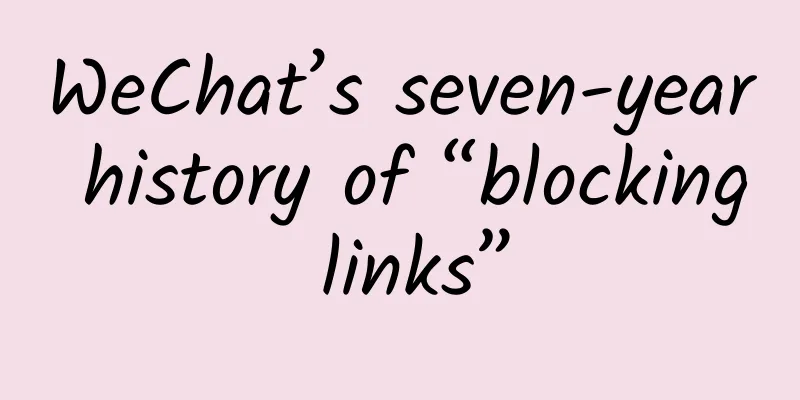WeChat’s seven-year history of “blocking links”

|
When it comes to Tencent's fight against commercial competition, WeChat is always at the forefront. Recently, WeChat banned the link of Feishu, a subsidiary of ByteDance, and once again attracted attention. Feishu issued an announcement that its related domain name was banned by WeChat for no reason. The system showed that the reason was that "the webpage contained content that induced sharing, following and other misleading behaviors, and was complained by many people." WeChat officials did not officially respond to this matter. In recent years, it has become common that links to other Internet products cannot be opened from time to time in WeChat. Taobao, Douyin, Kuaishou, Pinduoduo, Weishi, Duoshan, etc. are all or have been banned. In fact, since the "Tencent-ByteDance War" in 2018, almost all of ByteDance's products have found it difficult to spread within WeChat's traffic pool, and this open and covert struggle has continued to this day. Looking back at WeChat’s past banning of external links, it has been cracking down on and dealing with illegal external links since 2016. Earlier, it banned each other with Taobao. However, this “ban” is different from that “ban”. For seven years, WeChat has had WeChat-based external link control for Kuaishou and Weishi, as well as strict defense against Toutiao products such as Douyin and Feishu, as well as Alibaba products such as DingTalk and Taobao. So, what is the reason for WeChat to ban so many external links? What development nodes of the mobile Internet can we see behind this? WeChat and Taobao, who banned whom?WeChat officially started to crack down on illegal external links in 2016. In April of that year, WeChat officially released the "External Link Content Management Specifications", which introduced specific rules and announced the management and punishment methods for 8 major types of illegal links. But before that, WeChat had already been controlling external links for more than two years. As early as 2013, WeChat and Taobao had started a "link blocking war". However, WeChat was the one being blocked at the beginning. In August 2013, Taobao first blocked the Taobao customer interface of WeChat. By November, it blocked all links from WeChat. It is understood that at that time, Taobao had a tool platform for Taobao sellers, which provided third-party development software including statistical analysis, marketing, and management. Some sellers set up store pages on WeChat based on this system. Through this page, WeChat users can complete a one-stop purchase of Taobao store products on WeChat. After Taobao took the lead in blocking all links pointing to Taobao on WeChat, Taobao links could no longer be opened in WeChat friend conversations, Moments, or WeChat public account articles. Taobao explained that some users were deceived by clicking on fake Taobao links on WeChat, but WeChat did not have a technical team to handle these fake Taobao links spread on WeChat. Taobao had to block the links from WeChat for the sake of user data security. At that time, the outside world interpreted it as the rapid development of Tencent WeChat had threatened Alibaba's city, and Alibaba's measure was to prevent traffic from being controlled by third-party channels. In 2013, WeChat was launched for two years and WeChat public platform was launched for nearly a year. This year was also a year of rapid development for WeChat. Late at night on January 15, 2013, the Tencent WeChat team announced on Weibo that the number of WeChat users exceeded 300 million, making it the most downloaded and most used communication software in the world. Nine months later, on October 24, the number of WeChat users exceeded 600 million, with 100 million daily active users. It can be seen that at that time, WeChat users wanted to rely on Taobao's e-commerce ecosystem to do content, marketing, and social promotion on WeChat; Alibaba wanted to attract traffic to Alibaba products while firmly grasping its own e-commerce resources. WeChat and Taobao, as the two core traffic positions, were taken out by the two giants Tencent and Alibaba to defend against the enemy first. On the other hand, the tentacles of Alibaba and Tencent are also constantly extending into each other's hinterland. On one hand, Alibaba is accelerating its mobileization. For example, on September 23, 2013, Alibaba also launched the mobile social platform "Laiwang", which is also the first core project of the group to be officially unveiled after the establishment of the new network communication division of Alibaba; on the other hand, WeChat entered the field of mobile payment and launched WeChat payment in August 2013. A few months later, in mid-November, the number of users of "Alipay Wallet" reached 100 million, and Alipay Wallet was subsequently announced to become an independent brand. In this way, starting from 2013, the war between WeChat and Alibaba quietly began. Subsequently, WeChat also began to actively block Taobao links. In November 2013, there was news that Tencent App Store also removed Alipay Wallet from various recommended locations, and it could only be found through search. For a time, everyone was confused: Did Taobao block WeChat, or did WeChat block Taobao? It is reported that at that time, there were a large number of Taobao customer groups in WeChat, but they were banned in the following two years and the number of Taobao customer groups has become smaller and smaller. In June 2015, Alibaba officially released the Taobao password function, which means that after copying the Taobao password, you can directly jump to the corresponding page when you open Taobao. With the Taobao password, Taobao customers can sell goods on WeChat. At this point, the relationship between WeChat and Taobao has gradually changed from Taobao defending WeChat to Taobao needing WeChat's social relationship chain and traffic. Finally, WeChat has not lifted the block on Alibaba, but has changed from a complete block to "If you want to browse, long press the URL to copy and use the browser to access", and copying the Taobao password allows normal sharing. After that, WeChat has also been gradually building its own e-commerce ecosystem. On the one hand, it has developed on WeChat, and on the other hand, it has strategically cooperated with platforms such as JD.com and Dianping.com. WeChat provides them with access and attracts other players in the industry to counter Alibaba's e-commerce ecosystem. The secret competition between Tencent and AlibabaBy 2014, when attracting various Internet players, the competition between WeChat and Taobao was no longer focused on e-commerce and social networking, but on the broader mobile Internet consumption field, supporting traffic through strategic cooperation. For example, the online taxi-hailing industry was booming at the time. On November 24, 2014, Kuaidi Taxi issued a statement saying that the red envelope function for taxi rides was blocked by Tencent WeChat. "We call on Tencent to fulfill its commitment to openness, return market competition to fairness, give users the right to choose, and not ignore the interests of WeChat users for personal gain. To this end, we do not rule out taking legal measures to protect our own rights and interests and those of our users." WeChat responded that the reason why Kuaidi red packets cannot be shared in Moments is because it involves inducing sharing. "WeChat attaches great importance to user experience and will crack down on behaviors involving inducing sharing and malicious marketing. It will never tolerate it. This is a long-term and lasting policy." At that time, the competition in the domestic taxi-hailing software industry was entering a white-hot stage. Didi and Kuaidi were engaged in a money-burning war while clinging to the giants. Didi's backer was Tencent. In April 2013, Didi Dache received a $15 million round of financing from Tencent; Kuaidi Dache was backed by Alibaba, and Alibaba invested $10 million in Kuaidi Dache in the same year. This incident is considered to be an escalation of the ban war between Alibaba and Tencent, and the competition between Kuaidi and Didi is also seen as a contest between Alibaba and Tencent in the online taxi industry. It is reported that after WeChat banned the Kuaidi taxi red envelope link, users could no longer get red envelopes through WeChat friends, WeChat groups, and Moments. WeChat's prompt was "from an unreviewed application" or "failed to send." On the other hand, red envelopes from Didi, which has a strategic partnership with Tencent, are still flying everywhere, which has also caused many doubts about the fairness of WeChat's rules. However, at that time, everyone was more joking and wait-and-see about this - "You can change the way to send red envelopes, don't go to other people's vegetable gardens to grow vegetables." Blockchain evolution: commercial competition resistance and content ecological balanceIf the reason for WeChat's ban on external links was more due to commercial competition around 2014, then starting from 2016, WeChat, as a mature leading social product, has obviously increased its consideration and management of user experience and content ecological balance. Of course, the ban on external links based on commercial competition has never stopped. In April 2016, WeChat officially released the "External Link Content Management Standards", which listed eight major types of practices that violate the standards, including inducing sharing, inducing attention, H5 games, test content, and illegal acquisition of user data and information, and introduced specific rules and penalties. By relying on WeChat's growth fission gameplay, businesses and enterprises can rely on WeChat's huge user base and social relationship chain to obtain high profits at low cost. However, this move has made it impossible for many products that want to use WeChat's "fission growth" to easily obtain traffic in the WeChat ecosystem, and they can only take advantage of some WeChat social traffic dividends through community distribution. With its growing number of users, WeChat has begun to gradually optimize its user experience and content ecology. In 2017, paid knowledge began to gain momentum, when WeChat was already relatively mature and WeChat public accounts were still gaining momentum. WeChat's huge user base, traffic, social relationship chain, and the surge in WeChat payment users all provided ready-made marketing and dissemination channels for paid knowledge and new media marketing products. It is understood that in December 2017, the number of WeChat Pay card-linked users exceeded 800 million, it has cooperated with nearly 400 banks, and has more than 30,000 service providers. Around 2018, NetEase Cloud Classroom, Lizhi Micro Class, Qianliao, and even Xinshixiang Micro Class all flocked to WeChat, transformed into "micro-businesses" through the secondary distribution model, and dominated WeChat Moments for a while. They were subsequently banned by WeChat one after another. While WeChat is improving the external link standards every time, it actually has important and standardized external link methods. On May 18, 2018, WeChat released the "Announcement on Further Upgrading the External Link Management Rules". The content has been expanded to prohibit the release of marketing identification codes and password information, prohibit the change of user return paths, and prohibit the use of floating layers containing user privacy data. In this announcement, WeChat added a key point: "External links must not disseminate content containing audio-visual programs in any form without obtaining legal certificates such as information network audio-visual program dissemination licenses." This regulation caused great controversy at the time because many video platforms in the entire video field, including short videos, live broadcasts, and long videos, do not hold online audio-visual licenses. Of course, Tencent is on the list of Internet audio-visual program service licensees announced by the State Administration of Radio and Television, so Weishi was excluded. Subsequently, a list of short video apps that were "banned" by Tencent circulated on the Internet, including Toutiao apps such as Douyin and Xigua Video; short video platforms such as Kuaishou, Xiaokaxiu, and Haotu Video; live streaming platforms such as Huya, Inke, and Douyu; and audio knowledge payment platforms such as Duoduo and Himalaya... For a time, any method that would flood the circle of friends and attempt to benefit from the WeChat traffic pool was almost strangled in the cradle. Later, perhaps due to questions about fairness and the impact of vested interests, WeChat deleted this rule in its supplementary announcement to upgrade its external link management rules. However, it also revealed the signs of WeChat's ban and control of short video platform content in the future. The fight with ToutiaoWhat followed was the famous “Tencent-Bytedance War”. After WeChat banned several short video sharing links, it issued an "Announcement on the Recent Handling of Induced Violations and Malicious Confrontation" on January 27, 2019, reporting cases of illegal promotion of external links in WeChat Moments. It mentioned Didi and JD.com, which used tests and red envelope rewards to induce users to share with friends through WeChat. It also mentioned Toutiao, which used red envelopes to induce sharing and attract new users. WeChat said that testing and sharing red envelopes are both inducement behaviors, and that bypassing confrontation or repeated confrontation will result in heavier penalties. Repeated violations and confrontations will result in restrictions on WeChat login. WeChat will adopt a tiered handling mechanism for repeated violations and confrontations. It was during the Spring Festival at the time, and the red envelope war among Internet companies was in full swing. With this move, WeChat severely cracked down on the use of red envelopes to induce sharing and attract new users, as well as the use of QR codes, text links and text passwords to circumvent the rules. In fact, judging from the ban on WeChat in 2019, the rise of Toutiao, especially Douyin, and the difficulty of Weishi to "take off", have posed a great threat to WeChat. According to data, in August 2018, Douyin's global monthly active users reached 500 million, nearly half of WeChat. Although they are products in different vertical fields, as a huge traffic pool and entrance, WeChat is under great pressure. If the external link control for Kuaishou and Weishi is normal, then the control for Douyin and Feishu is obviously a strict defense against Toutiao products. Moreover, at present, WeChat has unblocked Kuaishou, but Douyin and other Toutiao products have not been unblocked. Sina Technology's test found that Douyin cannot be directly shared to Moments and WeChat friends, while Kuaishou can be shared to Moments, WeChat Kanyikan, WeChat friends and groups. After sharing to WeChat friends, the content is presented in the form of a mini-program. Bilibili and Kuaishou have the same sharing and presentation method. On March 5, Feishu, which was banned by WeChat, was quietly unblocked. Currently, Feishu-related links can be accessed normally in WeChat, but WeChat has not yet opened Feishu's API sharing interface, showing "No sharing permission obtained." WeChat has not made any relevant explanation or response to this. In fact, WeChat has recently banned the DingTalk health code and class-related sharing links, and announced some other third-party apps that have recently violated regulations in the "WeChat Pie" public account. WeChat said that the DingTalk health code was banned due to the sharing of password-type information, and access has been restored after DingTalk made rectifications. However, the link to the "class registration form" is still in violation. Currently, all kinds of invitation links of DingTalk, including invitations to return to work, invitations to take classes at home, invitations to friends, and live broadcast links, are banned and cannot be opened directly on WeChat. The most stringent blockade regulations have been issued, and the Jiugongge cannot escape the disasterIn 2018, after WeChat banned more than 30 video apps, netizens called out: Please ban "Pinduoduo", thank you! Facts show that the ban on WeChat will only be late, but will not be absent. Just before the 2019 Double Eleven, on October 28, WeChat’s latest version of the “WeChat External Link Content Management Specifications” was officially implemented. The upgraded external link specifications are called “the strictest in history” and have added four new types of violations: illegal use of avatars, inducing or misleading downloads and redirects, friend assistance, acceleration, bargaining, task collection and other activities, and illegal group buying. That night, WeChat officials also announced a list of banned external links, including bargaining products such as Pinduoduo and Yunji. Interestingly, in the “Public Notice of Some Illegal Links” displayed in the official article, there are also some external link information pictures from products such as Tencent News, Pinduoduo, and JD.com. Netizens therefore joked that “Tencent will even hit its own people when it gets ruthless.” This is not the first time that WeChat has cracked down on group buying. Prior to this, on May 13, 2019, the WeChat Security Center issued the "Announcement on the Handling of Inducement to Share Moments Check-ins", which pointed out that it is prohibited to induce users to share or disseminate external links or WeChat public account articles through the inducement of interests, including but not limited to: cash rewards, physical prizes, virtual prizes, collecting likes, group buying, sharing to increase the chances of winning a lottery and the probability of winning, and inducing users to share, click, and like WeChat public account articles with points or monetary benefits. Interestingly, before the new version of the regulations was implemented, there were rumors that "Tencent would withdraw from Pinduoduo." Although Pinduoduo responded that it was a normal change, many people interpreted it as suppressing Pinduoduo and curbing its wild development, as WeChat's new regulations on external links added new points such as bargaining and group buying. However, group buying has become a common form of shopping in e-commerce. WeChat, as the largest social product, has become a major battlefield, and Tencent does not take a one-size-fits-all approach to this. "Officially, we support group buying activities that comply with the law and respect user experience, but group buying activities that use money, physical objects or other benefits to lure people or are false or fraudulent are all illegal," WeChat said. Since then, Pinduoduo's bargaining links can no longer be shared on WeChat conversations, but they can be shared by copying passwords similar to Taobao. However, normal group buying links such as "Duoduo Orchard" can be shared normally. It is understood that this "strictest ever" new regulation stipulates that in the future, if there is any violation of the content of the external link, WeChat will verify the evidence based on user complaints and, depending on the severity of the violation, will take the following actions, including but not limited to: stop the continued dissemination of the link content on WeChat, stop access to the relevant domain name or IP address, and temporarily ban the sharing interface of the relevant open platform account or application; for serious cases, permanently ban the account, domain name, IP address or sharing interface. ConclusionWeChat has grown into a large and complex ecosystem. From the perspective of WeChat's entire history of blocking links, on the one hand, it needs to strictly guard against possible commercial competition and prevent its traffic and social relationship chains from becoming fertile ground for competitors. On the other hand, it also needs to protect the healthy social relationship chains and content under the WeChat ecosystem and optimize user experience. After all, WeChat's "private domain traffic" and "friend circle" are two major traffic positions. If you are not careful, they will become traffic operation disaster areas, thereby destroying the cornerstone on which it depends for survival. In addition, WeChat has been exploring commercialization in recent years, banning and sorting out complicated external links, which is also beneficial to WeChat's commercialization layout to a certain extent. For example, mini programs have become an important part of WeChat's e-commerce ecosystem. At present, WeChat will become more and more strict in preventing and controlling external links, especially links to competing products. However, will this be a long-term solution? |
<<: Foreign media: Apple's 5G mobile phone release postponed to October due to the epidemic
Recommend
[Stable Hang-up] World of Warcraft fully automatic hang-up brick-moving project, earn 50+ per day with a single number [fully automatic script]
[Stable Hang-up] World of Warcraft fully automati...
Sogou spent 1,000 yuan on promotion but got 0 conversions. What happened? There was consumption but no conversions.
Today I’m sharing a real case of a client who spe...
A Brief Analysis of Mobile APP Security and Compliance Testing Technology
1. Regulatory agencies and policies To ensure tha...
The first batch of mass-produced models equipped with Doubao large models, smart Elf 5 is about to be released
Today, the new luxury intelligent pure electric c...
Content Operation: How to connect content to users?
Operators often say "content connects users&...
Faster than Hong Kong! LeEco Super 3 X55 Pro full universe video first test
On the afternoon of September 24, LeTV officially...
With the same budget, which one will have better conversion rate between Douyin and Baidu?
Since 2016, when information flow entered the cou...
My Apple ID is locked. How can I fix it? I have learned a lot after reading this article.
Apple ID is locked, how to solve it? You will lea...
A must-read for APP operators, 108 examples of marketing tactics!
Introduction: In the recent Double Eleven e-comme...
5 ways to acquire 10 million users at low cost using mini programs
In the first quarter of 2017, the number of WeCha...
Detailed explanation of the 618 activity plan, it will be too late if you don’t read it now!
Today we are going to talk about how to implement...
How to optimize Weibo advertising creativity? Analysis of 2 advertising cases
This article shares two Weibo advertising optimiz...
Practical information: Zhihu promotion and traffic diversion only need to do these 3 things
Zhihu not only has a large amount of traffic, but...
Zhang Gang, Operation Director of Longzhu Live: Please get the operation logic that operators must know!
The Internet is a sea of pictures and texts, an...
Baidu's mobile phone dream reappears, but its ambition is in AI
"Confirmed, Xiaodu phone is coming." On...









